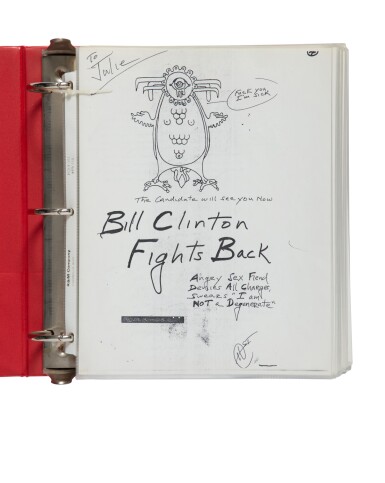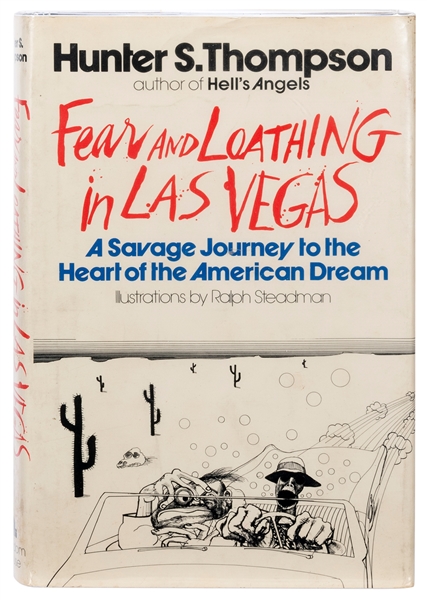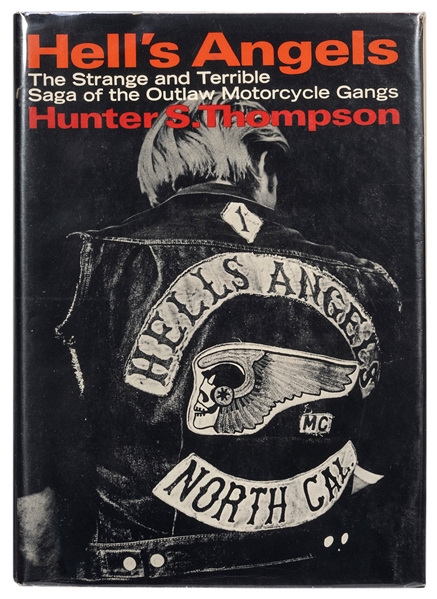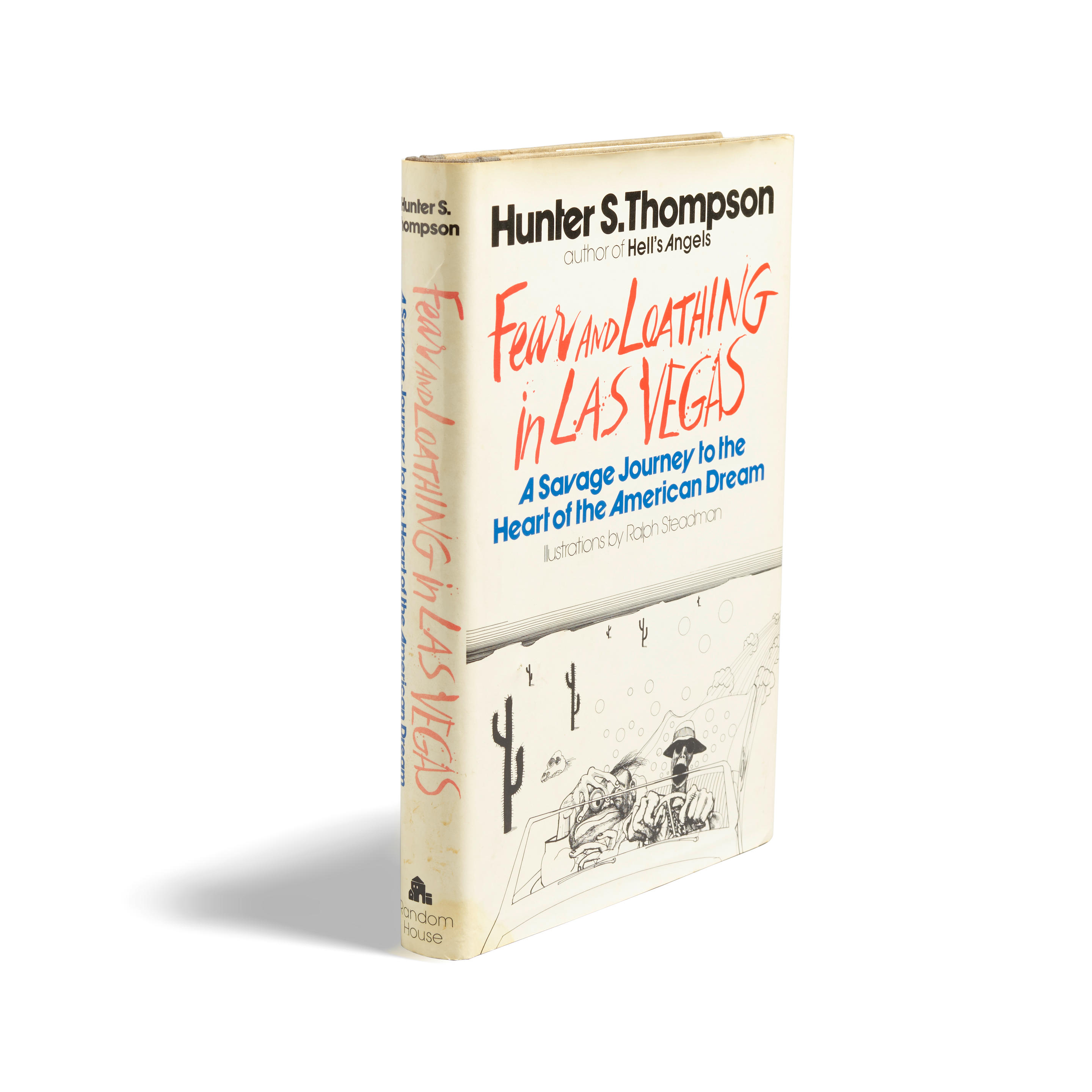Thompson, Hunter S. A collection of research material and notes from Thompson's time covering the impeachment process against Richard Nixon, in the wake of the Watergate scandal, Washington and San Francisco, circa July 1974
Comprising: Hearings before the Committee on the Judiciary House of Representatives[...]to investigate whether sufficient groups exist[...]to impeach Richard M. Nixon, Books I and II. Washington: U.S. Government Printing Office, July 2-11 1974. 2 volumes, 8vo. Paper wrappers, stamp to covers stating not for release until 24 and 25 July 1974 respectively; small spots to covers, Book II spine creased and toned. Autograph of Hunter S. Thompson to cover of Book I, text highlighted in red and black throughout Book I to 35 pages, usually designated with paperclip to upper edge, note to rear cover of Book II recording telephone number and War Bonnet Hotel, Butte (MT). Business card of Hunter S. Thompson tipped in to Book I.
[With:] 6 leaves with 7 pages of autograph manuscript notes by Thompson, on blank, typed and headed paper including The Rolling Stones, San Francisco, The Washington Hilton and a White House press release, 8vo and 4to; a few leaves creased. A note on The Rolling Stones headed paper asks, "Can Nixon suspend congress?", the following leaf recording Thompson's punishing schedule. The Washington Hilton headed paper references Nixon's San Clemente trip, references Judge Sirica ordering St. Clair to listen to the tapes, at heading "Chronology", signs off "The End - (liar..)". Typed draft leaf with paragraph circled in red pen commencing "Richard Nixon was not a friend of mine. He was an enemy, in fact, and I hated the ground he walked on for at least thirty years...", with manuscript notes in green. The White House press released, dated 17 July 1974, gives typed statement from the president mourning the death of Dizzy Dean, with manuscript notes to recto and verso by Thompson including, "post-coital depression" to upper left corner, "a weird movie with no director & no producer - the actors forget they're on film", and "Nixon comparing himself to Lincoln - a great artist. a great composer.", on reverse "difference between disaster + disgrace | Embarrassment", "Nixon finished himself | the system had no choice", and "Nixon made us suffer with him". Housed together in custom clamshell case.
A fascinating insight into Hunter S. Thompson's creative process as he covered the Watergate scandal and Nixon's downfall.
Hunter S. Thompson's loathing for Nixon is stark. He once wrote that Nixon represented "that dark, venal, and incurably violent side of the American character". Having covered Nixon's 1972 presidential campaign in Fear and Loathing: On the Campaign Trail '72, where his scathing opinion of Nixon peppers the book, Thompson's thirst for digging deep into political affairs and flavoring them with his distinctive Gonzo style was not abated. The Watergate scandal and subsequent investigation provided the perfect meat to sink his teeth into, and an opportunity for renewed admonishments of the man he hated so fervently.
Thompson acquired a copy of the judicial hearings of the impeachment trial against Nixon and highlighted 35 pages in bright red pen, marking them out with paperclips, including two lines from Mr. Butterfield (Alexander Butterfield, Nixon's former deputy assistant), "I had never seen that much money, of course, but I still didn't think of it as at all unusual. I assume that this is what you do on campaigns." and "That seemed a little strange at the time, but not really, because everyone trusted everyone."
Thompson became known for both his intensive attention for detail combined with often highly exaggerated versions of the truth, even fable, leading Frank Mankiewicz, McGovern's campaign manager to call Fear and Loathing: On the Campaign Trail '72 "the least factual, most accurate account" of the election. Thompson's political accounts revolutionized the way journalists talked about politics, how people read politics, and who read politics — these notes reveal how diligently he harvested the information to then be disseminated to the masses via Rolling Stone. Thompson wrote several pieces about the scandal, including "Fear and Loathing at the Watergate" (Rolling Stone, Sept 27 1973) and "Fear and Loathing in Washington" (Rolling Stone, July 4 1974).
A remarkable collection.
Thompson, Hunter S. A collection of research material and notes from Thompson's time covering the impeachment process against Richard Nixon, in the wake of the Watergate scandal, Washington and San Francisco, circa July 1974
Comprising: Hearings before the Committee on the Judiciary House of Representatives[...]to investigate whether sufficient groups exist[...]to impeach Richard M. Nixon, Books I and II. Washington: U.S. Government Printing Office, July 2-11 1974. 2 volumes, 8vo. Paper wrappers, stamp to covers stating not for release until 24 and 25 July 1974 respectively; small spots to covers, Book II spine creased and toned. Autograph of Hunter S. Thompson to cover of Book I, text highlighted in red and black throughout Book I to 35 pages, usually designated with paperclip to upper edge, note to rear cover of Book II recording telephone number and War Bonnet Hotel, Butte (MT). Business card of Hunter S. Thompson tipped in to Book I.
[With:] 6 leaves with 7 pages of autograph manuscript notes by Thompson, on blank, typed and headed paper including The Rolling Stones, San Francisco, The Washington Hilton and a White House press release, 8vo and 4to; a few leaves creased. A note on The Rolling Stones headed paper asks, "Can Nixon suspend congress?", the following leaf recording Thompson's punishing schedule. The Washington Hilton headed paper references Nixon's San Clemente trip, references Judge Sirica ordering St. Clair to listen to the tapes, at heading "Chronology", signs off "The End - (liar..)". Typed draft leaf with paragraph circled in red pen commencing "Richard Nixon was not a friend of mine. He was an enemy, in fact, and I hated the ground he walked on for at least thirty years...", with manuscript notes in green. The White House press released, dated 17 July 1974, gives typed statement from the president mourning the death of Dizzy Dean, with manuscript notes to recto and verso by Thompson including, "post-coital depression" to upper left corner, "a weird movie with no director & no producer - the actors forget they're on film", and "Nixon comparing himself to Lincoln - a great artist. a great composer.", on reverse "difference between disaster + disgrace | Embarrassment", "Nixon finished himself | the system had no choice", and "Nixon made us suffer with him". Housed together in custom clamshell case.
A fascinating insight into Hunter S. Thompson's creative process as he covered the Watergate scandal and Nixon's downfall.
Hunter S. Thompson's loathing for Nixon is stark. He once wrote that Nixon represented "that dark, venal, and incurably violent side of the American character". Having covered Nixon's 1972 presidential campaign in Fear and Loathing: On the Campaign Trail '72, where his scathing opinion of Nixon peppers the book, Thompson's thirst for digging deep into political affairs and flavoring them with his distinctive Gonzo style was not abated. The Watergate scandal and subsequent investigation provided the perfect meat to sink his teeth into, and an opportunity for renewed admonishments of the man he hated so fervently.
Thompson acquired a copy of the judicial hearings of the impeachment trial against Nixon and highlighted 35 pages in bright red pen, marking them out with paperclips, including two lines from Mr. Butterfield (Alexander Butterfield, Nixon's former deputy assistant), "I had never seen that much money, of course, but I still didn't think of it as at all unusual. I assume that this is what you do on campaigns." and "That seemed a little strange at the time, but not really, because everyone trusted everyone."
Thompson became known for both his intensive attention for detail combined with often highly exaggerated versions of the truth, even fable, leading Frank Mankiewicz, McGovern's campaign manager to call Fear and Loathing: On the Campaign Trail '72 "the least factual, most accurate account" of the election. Thompson's political accounts revolutionized the way journalists talked about politics, how people read politics, and who read politics — these notes reveal how diligently he harvested the information to then be disseminated to the masses via Rolling Stone. Thompson wrote several pieces about the scandal, including "Fear and Loathing at the Watergate" (Rolling Stone, Sept 27 1973) and "Fear and Loathing in Washington" (Rolling Stone, July 4 1974).
A remarkable collection.














Testen Sie LotSearch und seine Premium-Features 7 Tage - ohne Kosten!
Lassen Sie sich automatisch über neue Objekte in kommenden Auktionen benachrichtigen.
Suchauftrag anlegen